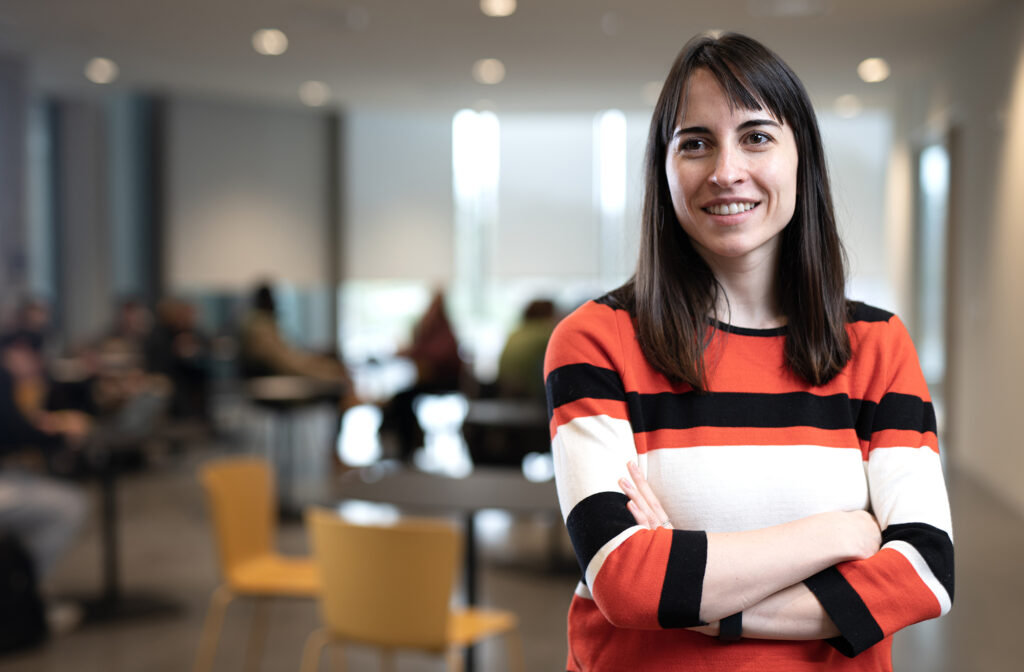The Human Behind the Accountant
When we think about accounting, we often think of computing numbers and a high degree of adherence to rules and regulations—maybe even that it is a purely objective profession. But Oriane Couchoux, assistant professor, Accounting, and a Chartered Professional Accountant (CPA), at the Sprott School of Business, knows that the profession is much more than that.
In fact, there is a whole realm of complexities and nuances surrounding the practice because, simply put, accountants are human. An obvious statement perhaps, but research in accounting looks predominately at relationships between numbers rather than relationships between accountants and their business partners.

Oriane is extremely excited to begin her career at Sprott as she injects a valuable and understudied sociological lens on how accountants feel about their roles—their relationships, their challenges, and how they navigate through the complexities and different pressures in the accounting world. Oriane’s goal is to highlight CPAs’ unique experiences and perspectives—to give them a voice—ultimately to provide tools for the profession to build better financial reporting processes and ensure the profession fulfills its commitment to the public.
Financial reporting and auditing processes are essential for investor decision making, and as such, must prove highly valuable and instill a high degree of trust and confidence. However, due to recurring corporate scandals involving accountants and auditors, independent regulatory organizations were established in many countries as proverbial “watch dogs” to reassure public and investor confidence and protection.
Since then, “there have been many rules implemented to improve the quality of the work performed by accountants and auditors, but there are complexities depending on cultural aspects, socio-political environments, and as such, there’s considerable room for interpretation by auditors and their regulators—they’re human, so of course each person will interpret and enact these rules differently—sometimes it creates good outcomes, but other times issues.”
This is where Oriane is particularly motivated with her research. Having worked as a CPA—both as an auditor and as an accountant responsible for preparing financial statements—Oriane understands the confounding effects of maintaining the best interests of the client and those of the public, keeping employer costs in check, and more recently, satisfying the external regulatory inspectors’ ideal around best practices.
Oriane recognizes this complexity is all about relationship management. It is a tug-of-war of different competing logics.
“There is the professional expectation to uphold public service, but also manage the relationships within the firm and with their up-front clients—and now their regulators.”
Oriane’s research explores these pressures through qualitative interviews to understand how auditors feel about these pressures, how they do their job, and how it impacts the quality of their work. Oriane recognizes the value of approaching the research with a social constructive lens because it brings so many of the unseen issues around financial reporting to the surface. And by better understanding the relationship dynamics between CPAs and their major constituents—as well as reveal the prevailing issues—Oriane believes her findings will contribute to developing initiatives that help CPAs and regulators navigate the multi-dimensionality of their roles more successfully.
Moreover, Oriane’s most recent research offers important new insights into governance processes and the crucial role corporate directors play in the ultimate success of financial reporting processes. Specifically, Oriane’s research teases out important self-reflective elements on audit-committee members’ perception of their financial literacy and ways this influences how they approach their oversight mission.
“The risk is creating audit committees comprised, on paper, of an eclectic pool of knowledge, and then having some of these audit-committee members underperforming in practice because they don’t believe they possess the necessary expertise to fully understand and oversee auditing and financial reporting processes.”
Oriane’s findings bring a novel sociological perspective to the implications of regulatory initiatives that focus on corporate directors’ resumes, titles, and designations, rather than on the skillsets directors in fact use and their willingness to engage.
For Oriane, one of the most alluring aspects of joining Sprott is being able to connect and collaborate with other academics who foster unique and novel approaches to research.
“I love the flexibility allowed to take my research in the directions that I feel most passionate about.”
On point, Oriane looks forward to future research projects that will continue to investigate the changes happening in the accounting profession, as well, explore the financialization and performance pressure associated with parenthood.
As a passionate advocate, Oriane is still very much involved with CPA Canada and is actively involved in non-profit organizations in Quebec that aim to find solutions to the “unprecedented daycare space shortage” and help women better manage career and family obligations.
Joining Sprott allows Oriane to combine her love of accounting research and its mission to public service, with her love of teaching and sharing knowledge—all while beautifully weaving her growing family. She is one amazing human behind the accountant.